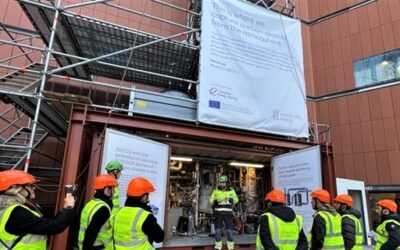What are heat networks operators doing to decarbonise their business? In many cases, decarbonisation of heat networks revolve around replacing fossil fuel energy generating assets with renewable energy sources, such as waste heat, biomass or energy from waste. However, a growing discussion is about utilising heat pumps and thermal storage in heat networks.
In August 2017, Swedish and British researchers, ESCOs, consultants and technology suppliers assessed the risks and benefits of integrating and utilising heat pump technology and thermal storage in heat networks during a workshop in London. Sweden has experienced a strong growth in the heat pump market in recent years and approximately 25% of detached housing is heated by heat pumps today. There is also a widespread use of thermal energy storage (TES) in Swedish heat networks.
The meeting aimed at identifying best practice case studies and key learnings from each stage in a project, including design, installation, commissioning and operation of heat pumps and thermal storage. The key learnings from the workshop, regarding the integration of heat pumps and thermal storage, can be summarised as follows.
![]()
Read more about heat pumps and thermal storage in the report The Heating Market in Sweden. Swedish participants during the workshop was Sweco, FVB, Research Institutes of Sweden, the Swedish Environmental Research Institute, Halmstad University, SWEP and Norrenergi, Business Sweden and the Swedish Energy Agency.
Sweden is at the forefront of decentralised heat networks technology. Our aim for “Heat Networks – Sustainability by Sweden” is to facilitate knowledge sharing between British and Swedish stakeholders and develop and encourage environmental and economic best practice.
To find out how we can help you and your organisation, please contact our London-based “Heat Networks” team. We can introduce you to leading consultants, suppliers of technology and services who will be pleased to share know-how of the development of heat network solutions.


